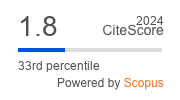Measuring the effect of Users' Privacy Concerns on the Use of Jakarta Smart City Mobile Application (JAKI)
Abstract
Jakarta Kini (JAKI) is a super-app developed by Jakarta Smart City that offers a one-stop service to help citizens connect and communicate with the Government. It is undeniable that the use of mobile applications can indeed facilitate people's activities, but on the other hand, it also poses risks and raises concerns in terms of privacy. The purpose of this study is to assess the impact of users' privacy concerns on their tendency to use the JAKI mobile application. To measure the privacy concern, we conduct an online survey of the users of JAKI. The hypothesis and research model were formulated to assess the users' privacy concerns based on the Mobile Users' Information Privacy Concerns (MUIPC) theory, with additional factors, namely prior privacy experience and awareness, as the antecedents. As a result, we found that MUIPC had a significant effect on negatively influencing the intention to use the JAKI application. Our study contributes as a starting point in exploring privacy research in the context of a smart city in Indonesia. Additionally, this study proved that the IPC scales that were originally designed for English-based countries could also be adapted to Bahasa Indonesia and utilized in the Indonesian context.
Downloads
References
L. Widiachristy and A. S. Rachmanto, "The Effectiveness of Jakarta Smart City Application in Enhancing Community Resilience in Facing Flood Risk," J. Archit., vol. 20, no. 1, p. 45, 2021, DOI: 10.12962/j2355262x.v20i1.a9034.
A. K. M. B. Haque, B. Bhushan, and G. Dhiman, “Conceptualizing smart city applications: Requirements, architecture, security issues, and emerging trends," Expert Syst., no. February, pp. 1–23, 2021, DOI: 10.1111/exsy.12753.
J. L. Hernandez-Ramos et al., "Security and privacy in internet of things-enabled smart cities: Challenges and future directions," IEEE Secur. Priv., vol. 19, no. 1, pp. 12–23, 2021, DOI: 10.1109/MSEC.2020.3012353.
H. Habibzadeh, B. H. Nussbaum, F. Anjomshoa, B. Kantarci, and T. Soyata, "A survey on cybersecurity, data privacy, and policy issues in cyber-physical system deployments in smart cities," Sustain. Cities Soc., vol. 50, no. August 2018, p. 101660, 2019, DOI: 10.1016/j.scs.2019.101660.
V. N. Hoa Hong and L. T. Anh, "Development trends of smart cities in the future - potential security risks and responsive solutions," Adv. Sci. Technol. Eng. Syst., vol. 5, no. 4, pp. 548–556, 2020, DOI: 10.25046/AJ050465.
L. Cui, G. Xie, Y. Qu, L. Gao, and Y. Yang, "Security and privacy in smart cities: Challenges and opportunities," IEEE Access, vol. 6, pp. 46134–46145, 2018, DOI: 10.1109/ACCESS.2018.2853985.
A. I. Tahirkheli et al., "A survey on modern cloud computing security over smart city networks: Threats, vulnerabilities, consequences, countermeasures and challenges," Electron., vol. 10, no. 15, 2021, DOI: 10.3390/electronics10151811.
N. H. Abosaq, "Impact of privacy issues on smart city services in a model smart city," Int. J. Adv. Comput. Sci. Appl., vol. 10, no. 2, pp. 177–185, 2019, DOI: 10.14569/ijacsa.2019.0100224.
D. Eckhoff and I. Wagner, "Privacy in the Smart City - Applications, Technologies, Challenges, and Solutions," IEEE Commun. Surv. Tutorials, vol. 20, no. 1, pp. 489–516, 2018, DOI: 10.1109/COMST.2017.2748998.
K. Zhang, J. Ni, K. Yang, X. Liang, J. Ren, and X. S. Shen, "Security and Privacy in Smart City Applications: Challenges and Solutions," IEEE Commun. Mag., vol. 55, no. 1, pp. 122–129, 2017, DOI: 10.1109/MCOM.2017.1600267CM.
K. Beck, "Smart security?: Evaluating security resiliency in the U.S. department of transportation's Smart city challenge," Transp. Res. Rec., vol. 2604, no. 1, pp. 37–43, 2017, DOI: 10.3141/2604-05.
E. Ismagilova, L. Hughes, N. P. Rana, and Y. K. Dwivedi, “Security, Privacy and Risks Within Smart Cities: Literature Review and Development of a Smart City Interaction Framework,” Inf. Syst. Front., 2020, doi: 10.1007/s10796-020-10044-1.
DetikNews, “Kecewa Warga Gegara Identitas Laporan via JAKI Terbuka.” https://news.detik.com/berita/d-5638817/kecewa-warga-gegara-identitas-laporan-via-jaki-terbuka (accessed Nov. 16, 2021).
L. van Zoonen, “Privacy concerns in smart cities,” Gov. Inf. Q., vol. 33, no. 3, pp. 472–480, 2016, doi: 10.1016/j.giq.2016.06.004.
J. Bartol, V. Vehovar, and A. Petrovčič, "Should we be concerned about how information privacy concerns are measured in online contexts? A systematic review of survey scale development studies," Informatics, vol. 8, no. 2, 2021, DOI: 10.3390/informatics8020031.
H. J. Smith, S. J. Milberg, and S. J. Burke, “Information Privacy: Measuring Individuals’ Concerns about Organizational Practices,” MIS Q., vol. 20, no. 2, pp. 167–196, 1996.
K. Bartel Sheehan and M. Grubbs Hoy, “Concern Consumers Kim Bartel Sheehan and Mariea Grubbs,” J. Public Policy Markeitng, vol. 19, no. 1, pp. 62–73, 2000.
N. K. Malhotra, S. S. Kim, and J. Agarwal, “Internet users’ information privacy concerns (IUIPC): The construct, the scale, and a causal model,” Inf. Syst. Res., vol. 15, no. 4, pp. 336–355, 2004, doi: 10.1287/isre.1040.0032.
T. B. C. P. and A. N. ;Ul.-D. R. Joinson;, "Development of Measures of Online Privacy Concern and Protection for Use on the Internet," J. Am. Soc. Inf. Sci. Technol., vol. 58, pp. 157–165, 2007, DOI: 10.1002/asi.
J. B. Earp, A. I. Antón, L. Aiman-Smith, and W. H. Stufflebeam, “Examining Internet privacy policies within the context of user privacy values,” IEEE Trans. Eng. Manag., vol. 52, no. 2, pp. 227–237, 2005, doi: 10.1109/TEM.2005.844927.
T. Dinev and P. Hart, "Internet privacy concerns and their antecedents -measurement validity and a regression model," Behav. Inf. Technol., vol. 23, no. 6, pp. 413–422, 2004, DOI: 10.1080/01449290410001715723.
A. Braunstein, L. Granka, and J. Staddon, "Indirect content privacy surveys," p. 1, 2011, DOI: 10.1145/2078827.2078847.
J. . Xu, H.; Gupta, S.; Rosson, M.B.; Carroll, “Measuring mobile users’ concerns for information privacy,” 2012, [Online]. Available: https://aisel.aisnet.org/icis2012/proceedings/ISSecurity/10/.
J. Gu, Y. (Calvin) Xu, H. Xu, C. Zhang, and H. Ling, "Privacy concerns for mobile app download: An elaboration likelihood model perspective," Decis. Support Syst., vol. 94, pp. 19–28, 2017, DOI: 10.1016/j.dss.2016.10.002.
A. Geovanny, I. W. Tong, J. A. Yang, and V. O. Vianto, “the Effect of Privacy Concern Towards the Intention To Accept App Permission on Batam Students Mobile Users,” no. 455, 2021.
K. Degirmenci, “Mobile users’ information privacy concerns and the role of app permission requests,” Int. J. Inf. Manage., vol. 50, no. April 2019, pp. 261–272, 2020, doi: 10.1016/j.ijinfomgt.2019.05.010.
C. B. Foltz and L. Foltz, "Mobile users' information privacy concerns instrument and IoT," Inf. Comput. Secur., vol. 28, no. 3, pp. 359–371, 2020, DOI: 10.1108/ICS-07-2019-0090.
B. Lopes, D. R. G. de Pontes, and S. D. Zorzo, "An instrument for measuring privacy in IoT environments," Adv. Intell. Syst. Comput., vol. 800 Part F, no. Itng, pp. 49–55, 2019, DOI: 10.1007/978-3-030-14070-0_8.
R. Wiegard, N. Guhr, S. Krylow, and M. H. Breitner, "Analysis of wearable technologies' usage for pay-as-you-live tariffs: recommendations for insurance companies," Zeitschrift fur die gesamte Versicherungswiss., vol. 108, no. 1, pp. 63–88, 2019, DOI: 10.1007/s12297-019-00431-2.
N. Guhr, O. Werth, P. P. H. Blacha, and M. H. Breitner, “Privacy concerns in the smart home context,” SN Appl. Sci., vol. 2, no. 2, 2020, doi: 10.1007/s42452-020-2025-8.
Copyright (c) 2022 Jurnal RESTI (Rekayasa Sistem dan Teknologi Informasi)

This work is licensed under a Creative Commons Attribution 4.0 International License.
Copyright in each article belongs to the author
- The author acknowledges that the RESTI Journal (System Engineering and Information Technology) is the first publisher to publish with a license Creative Commons Attribution 4.0 International License.
- Authors can enter writing separately, arrange the non-exclusive distribution of manuscripts that have been published in this journal into other versions (eg sent to the author's institutional repository, publication in a book, etc.), by acknowledging that the manuscript has been published for the first time in the RESTI (Rekayasa Sistem dan Teknologi Informasi) journal ;








